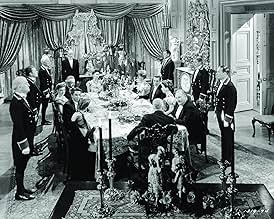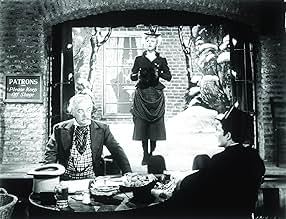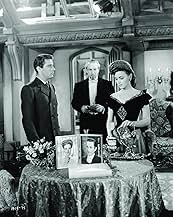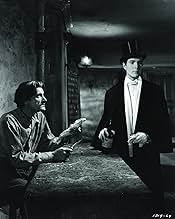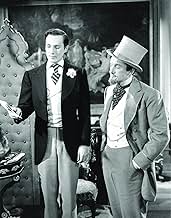Londoner Dorian Gray stays young, but his portrait ages.Londoner Dorian Gray stays young, but his portrait ages.Londoner Dorian Gray stays young, but his portrait ages.
- Won 1 Oscar
- 3 wins & 4 nominations total
Renee Carson
- Young French Woman
- (as Renie Carson)
Lilian Bond
- Kate
- (as Lillian Bond)
Devi Dja
- Lead Dancer
- (as Devi Dja and Her Balinese Dancers)
- Director
- Writers
- All cast & crew
- Production, box office & more at IMDbPro
Featured reviews
The key word for this movie is elegance. The cast move through sumptuous sets with the males dressed in immaculately tailored dress suits and the women exquisitely gowned. It seems that all the aristocrats lived in homes the size of Buckingham palace with high ceilinged rooms and magnificent staircases. They exchange Oscar Wilde epigrams in the cultured tones of the British upper classes.
Some great performances. Hurd Hatfield, an extremely handsome actor with a limited range ,gives the best one of his career as does George Sanders as the cynical Lord Henry Wotton, and a young Angela Lansbury is very moving (especially when she sings "The Little Yellow Bird").
One (very small) criticism. The color shots of the Dorian Gray portrait showing his degradation don't match the high standards of the rest of the design, they look more like pages from a horror comic. I think the producer's, with their obviously high budget, could have used a more imaginative artist.
As I say a small criticism. This a great film of psychological horror.
Some great performances. Hurd Hatfield, an extremely handsome actor with a limited range ,gives the best one of his career as does George Sanders as the cynical Lord Henry Wotton, and a young Angela Lansbury is very moving (especially when she sings "The Little Yellow Bird").
One (very small) criticism. The color shots of the Dorian Gray portrait showing his degradation don't match the high standards of the rest of the design, they look more like pages from a horror comic. I think the producer's, with their obviously high budget, could have used a more imaginative artist.
As I say a small criticism. This a great film of psychological horror.
This film adaptation of Wilde's story is certainly one of the great atmospheric black and white films of the 40's. Reminiscent of Greg Toland's ground breaking deep focus cinematography in "Citizen Kane",the shades of black, greys and whites are sharp and clearly deliniated to produce an unforgettable, somewhat eerie look to the film. There are a couple of short Technicolor shots that will make you jump. Cinematography is the star here but let's talk about Hurd Hatfield. I have seen this film on numerous occasions and have yet to figure out whether Hatfield is a great actor or just a woodenly inanimate object. Whichever is the case, this is the role of a lifetime.....it calls for an unfeeling, blank-faced characterization which is exactly as Hatfield played it. His smooth unlined visage hides many things and his apparent lack of emoting is right on target. Does that mean that he just couldn't act and fell into a role that suited his style or does it mean that he rose to the task and his interpretation was the sign of a great actor, living the part. I don't know....all I do know is that he pulls it off with great panache! He was playing against one of the great scene stealers of all times, George Sanders, who spouts Wilde epigrams with his own inimitable class and Hatfield holds his own. The other players are adequate but I don't know what all the excitement is about Angela Lansbury's acting....she was much better in "Gaslight". All in all, this is a movie that I would recommend but beware....it moves slowly, very slowly. Once you see it maybe you can answer the question about Hurd Hatfield's acting.....or maybe not!!!
It's hard to say what it is about "The Picture of Dorian Gray" that I enjoyed so much, but I did like it. Hurd Hatfield at first seems miscast and ineffective as the titular character, but somewhere around the one hour mark, his one and only expression begins to grow on you until you feel just as unnerved by his presence as those who come in contact with him in the story. George Sanders--from what I've seen--played one character his enter career but played it so well, and his performance in this film is no exception. Angela Lansbury is surprisingly sympathetic as the sad and timid singer. The only one in the cast who really doesn't work is Donna Reed. Her character feels tacked on, and she isn't allowed to do much but look faithful and beautiful.
The film is shot wonderfully, and Harry Stradling's cinematography gives the East End scenes a dark, atmospheric counter balance to the rather plain and flat interiors of Dorian's home. The swinging lamp was a nice touch and reminded me of "Psycho"'s finale.
I suppose my only criticism is toward the end, the story introduced one or two characters without giving them proper context or background (I'm thinking of the Allen Campbell character). I'm assuming Dorian "convinces" him to take part in his plans because of some sort past homosexual tryst, but it seemed unfair to bring him in they way he was, have him serve the role he does, and then disappear so quickly without explanation. And speaking of suggested themes: Is it just me, or could you make an argument that Dorian is Jack the Ripper? Maybe it's actually pretty obvious or maybe I'm just interpreting too much into the story, but that's what I got out of it.
P.S. I had the opportunity to see the actual painting from the film during an Ivan Albright exhibit at the Metropolitan Museum of Art in 1997. It's even more gruesome in person.
The film is shot wonderfully, and Harry Stradling's cinematography gives the East End scenes a dark, atmospheric counter balance to the rather plain and flat interiors of Dorian's home. The swinging lamp was a nice touch and reminded me of "Psycho"'s finale.
I suppose my only criticism is toward the end, the story introduced one or two characters without giving them proper context or background (I'm thinking of the Allen Campbell character). I'm assuming Dorian "convinces" him to take part in his plans because of some sort past homosexual tryst, but it seemed unfair to bring him in they way he was, have him serve the role he does, and then disappear so quickly without explanation. And speaking of suggested themes: Is it just me, or could you make an argument that Dorian is Jack the Ripper? Maybe it's actually pretty obvious or maybe I'm just interpreting too much into the story, but that's what I got out of it.
P.S. I had the opportunity to see the actual painting from the film during an Ivan Albright exhibit at the Metropolitan Museum of Art in 1997. It's even more gruesome in person.
Based on a story by Oscar Wilde, The Picture of Dorian Gray tells the story of a man that sells his soul for eternal youth. After having his portrait done, Dorian Gray, under the influence of the eloquent Lord Henry Wotton, wishes for the picture to age instead of him so that he may be blessed with eternal youth. After the death of his wife-to-be, Dorian embarks on a life of pleasure and sins, which don't affect the man in the slightest, but leaves it mark on the portrait which descends into a horrid impression of the handsome young man it's portraying...
This film is fantastically well put together. The acting, directing and writing are all stellar, which make this film one pleasant viewing indeed. The real plaudits for this movie, however, go to the writer of the original novel; Oscar Wilde. The story itself is ingenious. Of course, the idea of selling one's soul had been done before (the German legend, Faust, springs to mind instantly), but never in this way. The portrait itself is a genius idea and it allows us to see the man and the sin as different things. However, through it's ending; it also allows the audience to see that the two are linked, and overall giving a good commentary on body, soul and sin. The story has obvious themes of vanity and the lust for eternal youth entwined within it, both of which are sins in themselves. The main character of Dorian Gray is a man that is a victim of influence, and we can feel for him in that way; but he's also an ugly sinner on the inside, making the audience hate him. This is a strange situation for an audience to be in, and in the end; all that's left for him is indifference.
The film moves slowly, but this is definitely to it's advantage as it allows us to get to know the characters, and if it wasn't for that the horror wouldn't be able to work as it needs our emotional impact to function. The horror in the story is rather subdued, but this is one of the most horrific tales ever told. I think most people will agree that this kind of horror - the brooding, personal kind - is much more horrifying than anything that men with knives and any amount of jumpy moments can muster.
This film is fantastically well put together. The acting, directing and writing are all stellar, which make this film one pleasant viewing indeed. The real plaudits for this movie, however, go to the writer of the original novel; Oscar Wilde. The story itself is ingenious. Of course, the idea of selling one's soul had been done before (the German legend, Faust, springs to mind instantly), but never in this way. The portrait itself is a genius idea and it allows us to see the man and the sin as different things. However, through it's ending; it also allows the audience to see that the two are linked, and overall giving a good commentary on body, soul and sin. The story has obvious themes of vanity and the lust for eternal youth entwined within it, both of which are sins in themselves. The main character of Dorian Gray is a man that is a victim of influence, and we can feel for him in that way; but he's also an ugly sinner on the inside, making the audience hate him. This is a strange situation for an audience to be in, and in the end; all that's left for him is indifference.
The film moves slowly, but this is definitely to it's advantage as it allows us to get to know the characters, and if it wasn't for that the horror wouldn't be able to work as it needs our emotional impact to function. The horror in the story is rather subdued, but this is one of the most horrific tales ever told. I think most people will agree that this kind of horror - the brooding, personal kind - is much more horrifying than anything that men with knives and any amount of jumpy moments can muster.
One of my personal favorites of films of the '40s is this visually striking version raising the art of black-and-white photography to new heights. The sets and costumes and deep-focus photography combine to make even more absorbing the story Oscar Wilde tells of the man whose portrait decays as he himself remains forever youthful. Hurd Hatfield never had a better role and he makes the most of it. George Sanders, Angela Lansbury, Donna Reed, Peter Lawford, Lionel Gilmore, George Sanders, Morton Lowry and many others contribute to the overall excellence of the acting. The period atmosphere of late-Victorian London adds much to the slowly growing horror of the tale. Complaints by others on this message board that the film is too slow or too talky are foolish. If you want action and special effects, see a Clint Eastwood or Bruce Willis film--forget this. But as a compelling and psychological study of a man influenced by evil (personified by George Sanders as Lord Henry), this version is better than any of the others made since. It's chilling, the way Wilde intended, and no one could deliver his cynical yet witty observations about human nature better than George Sanders. By all means, an outstanding film. Should be required viewing as a study of the art of black-and-white cinematography.
Did you know
- TriviaIn the novel, Sibyl Vane called Dorian Gray "Prince Charming", not "Sir Tristan".
- GoofsAt approximately 34:35 into the film, the time on the clock in the room suddenly changes from just after 2 o'clock to 3 o'clock. Then at approximately 37:00 it moves back to 2:05 and then to 2:09 as Dorian continues to play the piano.
- Quotes
Lord Henry Wotton: "If I could get back my youth, I'd do anything in the world except get up early, take exercise or be respectable."
- Alternate versionsSome prints are slightly edited, omitting Dorian's prayer and Lord Henry's line, "Heaven forgive me" in the final scene.
- ConnectionsFeatured in The Cinematographer (1951)
- SoundtracksGood-Bye, Little Yellow Bird
(uncredited)
Lyrics and Music by C.W. Murphy and William Hargreaves
Performed by Angela Lansbury
Details
- Release date
- Country of origin
- Official site
- Language
- Also known as
- El retrato de Dorian Gray
- Filming locations
- Production company
- See more company credits at IMDbPro
Box office
- Budget
- $3,500,000 (estimated)
- Runtime1 hour 50 minutes
- Color
- Aspect ratio
- 1.37 : 1
Contribute to this page
Suggest an edit or add missing content

Top Gap
By what name was The Picture of Dorian Gray (1945) officially released in India in English?
Answer

